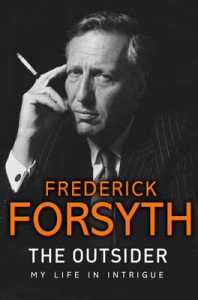Currently reading
Eleven
A Month in the Country
A Tale of the Dispossessed: A Novel
Mesabi Pioneers
The Crusades Through Arab Eyes
Island of a Thousand Mirrors
The Outsider: My Life in Intrigue
 Forsyth's story is not just about adventure and intrigue, although they are significant. He is still angry about the British role (the government and the BBC) in the Nigerian civil war of the late 60s, a conflict I knew little about before starting the book. He has something to tell us about the individuals involved, the suffering, the lies and coverups. Forsyth's autobiography is refreshing in that it is not all about him, somehow. It is also about the U.K., Europe, and Nigeria in the mid 20th century. It is a primer on British intelligence and the media's relationship with the government.
Forsyth's story is not just about adventure and intrigue, although they are significant. He is still angry about the British role (the government and the BBC) in the Nigerian civil war of the late 60s, a conflict I knew little about before starting the book. He has something to tell us about the individuals involved, the suffering, the lies and coverups. Forsyth's autobiography is refreshing in that it is not all about him, somehow. It is also about the U.K., Europe, and Nigeria in the mid 20th century. It is a primer on British intelligence and the media's relationship with the government. I must admit I had trouble getting into the book. I made a couple attempts that didn't get past page 30 or so. He was incredibly lucky in his background, his parents, his situation in life. The weakest parts of the book are at the beginning and end, when it is mostly about him, and he complains about the disadvantages of being rich in a very British way (applied for scholarship, but darn it all if he father wasn't too rich for him to be selected...). But give it a chance and push through -- once he got rolling, I couldn't put it down. And I learned a great deal, since I've mostly learned about the history of the 1950s-70s through an American lens... once WWII was over, our history focus turns to ourselves and, of course, Vietnam. It turns out that while we were focused on Vietnam, or trying very hard not to be, depending on individual preferences, Britain was trying very hard not to be focused on Nigeria. But Forsyth was in the thick of that conflict by choice, over and over again. It's the core of the book and a fascinating read.
I strongly recommend the book on its own merits, regardless of whether you've come to know Forsyth through his novels or not. He's built a life out of saying yes to opportunities, grasping at the slightest straw of acquaintances to get what he wanted most, and has a story worth listening to as a result.
I got a free copy of this through First to Read.









